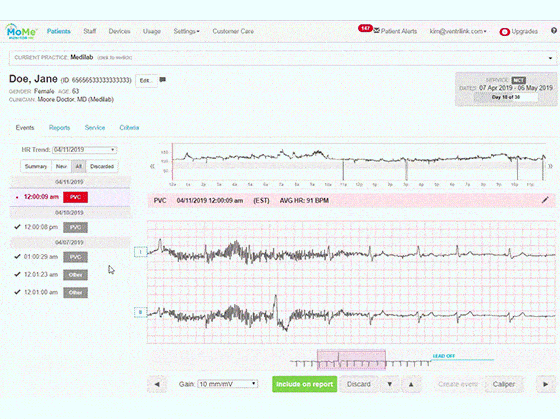
What You Should Know:
– Cardiac patients and their cardiologists are experiencing a high number of false positives with remote patient monitoring devices as a result of signal artifact providing inaccurate data, which can lead to many complications—other than medical, such as unnecessary tests and increased medical costs.
– Ambulatory cardiac monitoring provider InfoBionic has devised a way to decrease false positives and increase efficiency.
Remote cardiac monitoring’s false positives—especially on atrial fibrillation (Afib)—hurt everyone, from the patient to the boss who will have to go without an employee when he or she has to go in for unnecessary tests. An estimated 12.1 million people in the United States will have Afib by 2030; Afib increases the risk of stroke, heart failure, and death, and is one of the few cardiac conditions that continue to rise.(1) “We must give the clinician more effective diagnoses, while at the same time increasing confidence in our healthcare technology systems with respect to the accuracy of the same patient data,” expressed Stuart Long, CEO of InfoBionic, a provider of ambulatory cardiac monitoring services.
Impact of Remote Patient Monitoring on Afib
Afib is a “fluttering feeling that can point to a quivering heart muscle, a notable skipped beat as the mark of a palpitation, and a racing heart rate that sparks other discomforts.” (2) With the rise of remote patient monitoring (RPM) as an effective and economical modality to treat and monitor patients, false positives continue to rise to generate a lack of confidence in the accurate clinical data captured through RPM. False positives can overwhelm the clinician and result in the increased use of resources and downstream costs, and false negatives could have detrimental clinical consequences.(3)
Without a reliable RPM supported by powerful AI solutions, healthcare payers experience higher costs. Heart disease takes an economic toll, as well, costing the nation’s healthcare system $214 billion per year and consuming $138 billion in lost productivity on the job. (4) The cascading effect of false positives run the gamut of the human experience—from the physical and emotional health of the patient to the added out-of-pocket expenses of unnecessary and avoidable tests.
The increased risks of hospital readmissions at a time when healthcare systems are overtaxed and understaffed adds another factor of what could have been an unneeded situation. “InfoBionic AI has all but eliminated the need for physicians to deal with false positives. In fact, 100% of Atrial Fibrillation events longer than 30 seconds are detected accurately (true positive) by InfoBionic’s AI system(6),” said Long.
By leveraging cloud computing with continuous arrhythmia monitoring to create a reliable platform with accurate data collection, an ambulatory cardiac monitor, such as the MoMe® Kardia device, optimizes AI solutions, allowing for consistency in the treatment. Integrated sensor measures have been shown to predict heart failure and might have the potential to empower patients to participate in their own care.(5) Offering 24-hour monitoring through RPM technology that reduces false positives leads to the patient becoming more comfortable with the RPM service, which increases the likelihood the patient will adopt the practice of self-care well into the future. Cardiac patients with pulmonary or electrolyte problems may need continuous cardiac monitoring to screen for arrhythmias.
“A primary feature of our MoMe® Kardia is its ability to leverage technology in a way that makes physicians feel more confident via analysis precision that verifies detected cardiac episodes through the algorithm,” said Long. Another distinct advantage is the ability to provide 6 lead analysis instead of the 1 or 2 leads provided by other systems. This affords the physician a much better view of each heartbeat, thereby increasing physician confidence in the accuracy of diagnosis.
The AI provides valuable clinical statistics that guide treatment with the best patient outcomes. As the leading provider to collect every heartbeat and transmit it to the cloud in near real time, explains Long, InfoBionic’s AI algorithms are informed by over 15 million hours of electrocardiogram (ECG) collected from the entire patient population. With full disclosure transmission that allows AI algorithms to run on powerful servers in the cloud, the system utilizes much more intensive processing than could be accomplished on other patient-worn devices. Multiple patented algorithms are run concurrently on the ECG stream, each with superior performance on a variety of clinical conditions.
